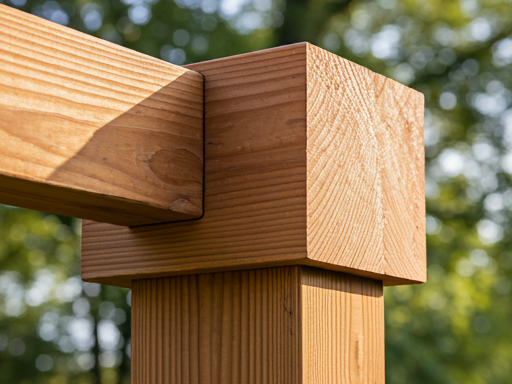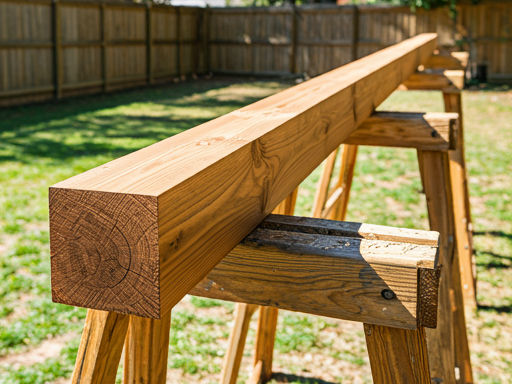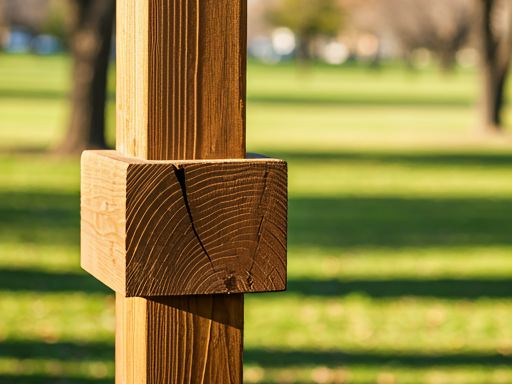A pergola is a popular outdoor addition that provides shade and beauty. Material selection, especially beams, is crucial when designing your pergola. “Can you use a 4×4 for a pergola beam?” is a popular planning question. 4×4 beams are readily accessible and cheaper than more extensive options, but you must consider their limitations and suitability for your pergola design. This article discusses utilizing a 4×4 as a pergola beam and offers crucial considerations. These characteristics may help you choose a safe and attractive pergola.
Pergola beams and role
Horizontal beams between pergola pillars support rafters and give pergolas their open, airy shape. They support the rafters, climbing plants, lighting, and canopy, ensuring the pergola’s structural stability. Use the proper beam size and kind to keep the pergola robust and safe. The structure could collapse without sufficient support, posing safety risks or requiring costly repairs.
Beam design impacts pergola strength and look. Beams, visible from below, can highlight the architecture.
Can You Use a 4×4 Pergola Beam?
A 4×4 can be a pergola beam, although it may not be optimal. Small pergolas can use 4×4 beams, but larger ones need stronger ones. Before using a 4×4 beam, consider your pergola’s span, load, and design. Let’s talk about why 4×4 beams might not work for your job. How well the beam holds weight, length, and materials should determine its suitability.

Use of 4×4 for Pergola Beams: Considerations
1. load-bearing capacity
4×4 beams cannot support as much weight as 4×6 or 6×6 beams. Due to their lower cross-sectional area, four-wheel-drive cars may carry less weight. A 4×4 beam may not sustain large wooden rafters, hanging lights, or climbing plants in your pergola. Sagging or structural failure may result from using a 4×4. Ensure the beams can handle the estimated weight and wind or weather loads.
2. Length of span
The span separates two supporting posts. The span of a 4×4 pergola beam should not exceed 6 feet. Due to weight, 4×4 beams may bend or bow over long spans. A 4×4 may weaken the stability of larger pergolas with broader spans, making them less robust. Understand that even minor bending can cause significant issues over time, damaging your pergola’s function and look.
3. Design aesthetics
Using a 4×4 for a pergola beam is based on strength and aesthetics. Because pergolas are generally constructed to appear suitable, more significant, broader beams can make them look stronger. A 4×4 beam may work for smaller pergolas but may be too thin for larger ones. Thus, 4×6 or 6×6 beams may be better for aesthetics. Thicker beams provide elegance and sophistication to your pergola, making it stand out in your outdoor space.
4. Material quality and type
The wood you use can also affect whether a 4×4 beam is suitable. More vital, insect- and weather-resistant woods include cedar and pressure-treated pine. A high-quality, thick lumber can make a 4×4 pergola beam more practical. The size and span remain restricted even with stricter wood, so plan accordingly. If you reside in a humid or rainy area, treat the wood to prevent decay and rot.
When Should I Use a 4×4 Pergola Beam?
In some cases, a 4×4 pergola beam can work. For instance:
1. Short-Span Small Pergolas:
If your pergola has shorter spans (less than 6 feet), 4×4 beams may be practical and cost-effective. Although minor, these pergolas can give shade and beauty without heavy beams. A tiny pergola over a garden bench or deck may work with 4×4 beams. They are also ideal for creating warm corners or designating garden sections without taking up too much room.
2. Low-load decorative pergolas
4×4 beams can support a stylish pergola without much weight. If the pergola is an ornamental garden feature without heavy rafters or hanging features, a 4×4 may work. Under such circumstances, you can utilize 4×4 beams to build a light, airy structure that complements your yard without heavy construction.
3. Budget-friendly projects
DIYers and those on a budget will find 4×4 beams cheaper than more giant beams. If the economy is essential and the project can accept lower spans and lighter loads, a 4×4 may be a viable choice. Building a pergola with 4×4 beams enhances your backyard’s style and functionality without incurring significant costs.
Alternatives to 4×4 Pergola Beams
If, after considering the aforementioned elements, a 4×4 may not support your pergola, there are various alternatives:
1. 4×6 beams
Upgrade to a 4×6 beam for strength and support without bulk. Those seeking stability can use these beams instead of 4x4s because they are still straightforward to find and install. Their affordability and durability make them suitable for medium-sized pergolas without the cost of more giant beams.
2. 6×6 beams
For larger pergolas or constructions that sustain huge weights, 6×6 beams are ideal. They are more robust and can span considerable distances without bending or sagging. Although more expensive and heavier, they are worth considering for durable projects. A 6×6 beam allows your pergola to support thick timber rafters and heavier ornamental items.
3. Double-up 4x4s
Sometimes, stacking together two 4x4s creates a thicker, stronger beam. While this approach can provide additional support while maintaining a similar visual profile, its strength may not match that of a single, more giant beam, necessitating careful examination. If you have 4x4s but need additional pergola strength, double up beams.

Pergola Building Tips with 4×4 Beams
If you use 4×4 beams for your pergola, follow these tips to make it strong:
- Keep Spans Short: Reduce sagging by limiting supporting post-distance. Shorter spans reduce beam weight, making the structure more sturdy. Additional posts can reduce span length and provide support when needed.
- Choose Quality Wood: Choose dense, weather-resistant wood. Cedar, redwood, and pressure-treated pine are ideal outdoor materials. High-quality wood can survive the elements, keeping your pergola beautiful for years.
- Reinforce Connections: Ensure all connections are secure and use metal brackets or other reinforcements where the beams meet the posts. Strong connections are essential to minimize structure shaking, especially in windy situations.
- Regular Maintenance: Check the pergola for wear and sagging.
FAQ
A 4×4 can be a pergola beam, but only for tiny, lightweight pergolas with short spans. Heavy structures may need 4×6 or 6×6 beams for stability.
For spans under 6 feet, a 4×4 beam is best. Underweight, longer spans may bend or sag the beam, weakening the pergola.
A 4×4 beam can only support a limited load. Pergolas with hefty rafters, hanging plants, or other features may find the 4×4 beam too weak. We advise using 4×6 or 6×6 beams in such instances.
Cedar, redwood, and pressure-treated pine are top-notch 4×4 pergola beam woods. Weatherproof and decay-resistant, these woods are appropriate for outdoor use.
For stronger support, use 4×6 or 6×6 beams instead of 4×4. Double 4x4s may not be as stable as a single, thicker beam.
For more tips, keep visiting ImprovementOfHome.com.

